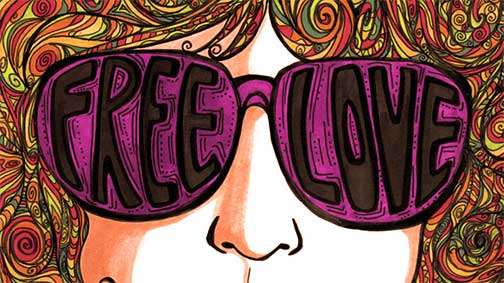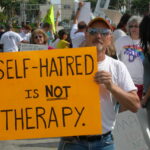Reviews, The Sexual Revolution
Understanding our strange new world
If I had to recommend a single book that explains what has happened to Western civilization from a historical and intellectual point of view, I would urge you to read Carl Trueman’s Strange New World: How Thinkers and Activists Redefined Identity and Sparked the Sexual Revolution, published last year by Crossway.
Trueman is a professor and historian who teaches at Grove City College in Pennsylvania, where one of his areas of scholarly interest is the “rise and impact of modern notions of selfhood on contemporary culture.” That research resulted in the publication, two years ago, of his 400-page The Rise and Triumph of the Modern Self: Cultural Amnesia, Expressive Individualism, and the Road to Sexual Revolution. It is a dense, powerful read, and it put Trueman on the map not only as a historian of ideas, but as the man capable of explaining our current moment. In a world gone mad, Trueman has answers.
Strange New World is a condensed version of his 2020 offering for a broader, less philosophically inclined audience. It is eminently accessible and should be widely read by anyone who wishes to grasp our historical moment. Not many historians become famous, but Trueman’s work is having something of a moment. The Daily Wire’s Matt Walsh, who interviewed Trueman for his documentary What is a Woman?, referred to him recently as one of the most important public thinkers alive. I’ve seen Trueman’s work cited all over the place recently, and he’s been making the long-form podcast rounds.
In the space of 208 pages, Trueman explains how sex, gender, and how one “presents” became an expression of the inner self—of ‘my truth’—and how social recognition of that public-facing inner self became a fundamentally political project. As Ryan T. Anderson noted in his foreword, Trueman has laid out, both historically and philosophically, “how the person became the self, the self became sexualized, and sex became politicized.” With the personal becoming political in a literal sense, every public space has become a battleground, with any refusal to recognize someone’s subjective truth being seen as akin to violence. The cultural implications of this are obvious and everywhere.
Just a few historical moments ago, people considered themselves creatures—part of a Creation, brought into being by a Creator. The responsibility of creatures was to orient themselves towards truth and to submit to objective moral standards outside of themselves. With what Philip Rieff called “the triumph of the therapeutic,” it is the therapists rather than the theologians who are in charge. Now, our inner lives have become the only source of truth—“my truth”—and everything, including objective reality and language, must conform to “my truth.”
The rise and triumph of these ideas has converged with the arrival of technology that increasingly makes a transhuman future possible—where the concept of a “sex change” can become believable because we have surgeries and silicon and plastic that can transform men and women into convincing doppelgangers of each other. We are using science to create a dystopia of Barbie dolls that look not like who they are, but who they imagine themselves to be. So how did our world go from the way that it was for thousands of years to the way that it is? Trueman makes the case that three intertwining currents of thought have converged to create this historical moment:
- Expressive individualism
- The sexual revolution
- Social imaginary
It may be useful here to examine each of these three intellectual and historical movements separately to facilitate a grasp of how they have collectively shaped (and facilitated) our post-Christian culture.
Expressive individualism
Robert Bellah defined the phrase as follows: “Expressive individualism holds that each person has a unique core of feeling and intuition that should unfold or be expressed if individuality is to be realized.” A Christian, holding to the Scriptural admonition that “the human heart is desperately wicked,” might argue that acting on our feelings would be following precisely the wrong guide—that suppression of many desires and impulses is essential not only for a Christian life, but for a fulfilled life. But the individualist would argue that the modern self can only emerge when “authenticity” is achieved—and that can only occur when one acts in accordance with one’s inward feelings. Thus, Trueman notes, expressive individualism was a necessary precondition for the sexual revolution.
Trueman’s conclusion is succinct: “It is my conviction that the dramatic changes and flux we witness and experience in society today are related to the rise to cultural normativity of the expressive individual self, particularly as expressed through the idioms of the sexual revolution. And the fact that the reasons for this are so deeply embedded in all aspects of our culture means that we all are, to some extent, complicit in what we see happening around us. To but it bluntly, we all share more or less the same social imaginary.”
Because the “inner self” has taken the primary place in our social imaginary (which we will get to shortly), the body must be changed to fit the mind rather than vice versa. You are what you feel you are. Any objection to how you feel is violence, which is also felt. Once you understand that, a lot of what you see in the news will start falling into place.
Trueman summarizes several of the prominent thinkers who laid the groundwork for the cultural rise of expressive individualism. There was Rene Descartes, who famously said: “I think, therefore I am.” There was Jean Jacques Rosseau, who emphasized the fundamental importance of the inner life, where the “real person” was to be found. (His life highlighted the limits of his philosophy—he infamously sent all five of his children off to orphanages shortly after they were born. He did, however, have opinions on how children should be educated.) Karl Marx’s materialism rejected any sacred foundation or moral order and believed that material conditions shape how we see reality and impact our self-consciousness and identity. In fact, says Trueman:
Marx lays the groundwork for some of the most basic of our culture’s contemporary intuitions: religion is a sign of intellectual weakness in it its adherents and a means of social oppression for its proponents. Further, freedom can only be achieved by the abolition of religion.
You may have heard commentators like Jordan Peterson using the phrase “cultural Marxism” and wondered what it meant. One simple answer is this: that everything, from wedding cakes to playgrounds to classrooms, is now political. Marx was helped along by Friedrich Nietzsche, who asserted that because there is no God, we must create ourselves and become the masters of self-creation. Thus, morality is taste. “The language we use confirms that Nietzsche’s perspective is now a cultural intuition,” Trueman observes. “So often we speak of morality in terms of taste or aesthetics: ‘That remark was hurtful’; ‘That idea is offensive’; ‘That viewpoint makes me feel unsafe.’” Combine Nietzsche with social media, and everyone becomes a self-creation.
The Sexual Revolution
A total overthrow of Judeo-Christian sexual ethics was a fundamental part of these emerging intellectual currents. I’ve written extensively about a number of the key sexual revolutionaries in the past; Trueman’s chapter is succinct and helpful. He pinpoints thinkers such as Wilhelm Reich, who believed that the family needed to be dismantled for true sexual liberation to take place and was the father of gender ideology, as well as the infamous Alfred Kinsey. The sexual revolution, Trueman notes, was in some ways an inevitable consequence of the slow triumph of expressive individualism. Along with the Romantics, the idea that sex is not what we do but who we are took root—it is now a cultural dogma. (This part of the book reminded me of a fascinating 2014 essay in First Things titled “Against Heterosexuality.” If you’re interested in how we developed our ideas of sexual identity, give it a read.)
The sexual revolution, as I mentioned earlier, had profound political consequences. As Trueman put it: “If a person is in some deep sense the sexual desires they experience, then how society treats those desires is an extremely important political question. Further, the political struggle itself shifts into the psychological realm: oppression is now not simply something that involves being deprived of material prosperity or physical freedom.” Anything that has a negative impact on someone’s psychological identity can now be seen as “harmful”; thus, freedom of speech and freedom of religion are in danger of being sacrificed on the sexual revolution’s altar of expressive individualism.
Take, for example, the concept of modesty. Trueman: “The sexual revolution did not redefine modesty; it overthrew it completely. Even to raise such questions as to the modesty of bikinis or skirt length today will likely elicit at best laughter and at worst some rebuke for daring to tell somebody how to dress. In short, the very concept of modesty is now considered to be repressive, an oppressive assault on individual authenticity.” This, by the way, would also be true of most Christians—despite the fact that when designer Louis Réard debuted the bikini, he had to turn to Parisian stripper when professional models declined to appear in public nearly nude.
The new dominant worldview in the West may be best summed up by Justice Anthony Kennedy’s words in Planned Parenthood v. Casey, which upheld abortion as a constitutional right: “At the heart of liberty is the right to define one’s own concept of existence, of meaning, of the universe, and of the mystery of human life. Beliefs about these matters could not define the attributes of personhood were they formed under the compulsion of the state.” In other words: You do you, man. And you do whoever you want.
Social Imaginary
Philosopher Charles Taylor, author of A Secular Age, defined a social imaginary as how people “imagine” or perceive their surroundings, shaped by images, stories, legends; it is everything that makes up “that common understanding which makes possible common practices and a widely shared sense of legitimacy.” Our social imaginary today is shaped not only by a post-Christian culture, but by an increasingly anti-Christian one. Our culture’s storytelling institutions—Hollywood, the small screen, much of our literature—have been entirely captured by the sexual revolutionaries. Even children’s entertainment sells the revolution, from lesbian polar bears on the TV show Peppa Pig, to same-sex families on Disney blockbusters, to beloved animated characters coming out as queer.
What must we do?
So how do Christians build communities, raise their children, and be a salt and light in a culture with values—and stories—that are fundamentally at odds with Christianity? Trueman sees historical parallels to another era, and a distinct advantage of our own. “There are obviously fundamental differences between the church in the second century and the church in America—we are deChristianizing,” he writes. “In our context, Christianity has been known and is being repudiated. In the second century it was an unknown quantity. But what makes the church powerful as a force in the first and second centuries is its community aspect. Not just families, but the power of the Christian community as a community.”
“Push back against the age as hard as it pushes against you,” Flannery O’Connor once wrote. To respond to the times we live in, we must first understand them. Trueman’s Strange New World is an excellent place to start.








